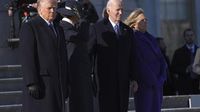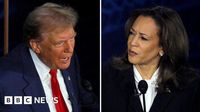In a bold and controversial move, President Donald Trump has revoked security clearances for his political rivals, including former President Joe Biden, former Vice President Kamala Harris, and several former Biden administration officials. This sweeping decision, outlined in a memo titled “Rescinding Security Clearances and Access to Classified Information from Specified Individuals,” was issued late on March 21, 2025, and marks a significant escalation in the long-standing feud between Trump and his Democratic opponents.
Trump determined it was “no longer in the national interest” for these individuals to hold “any active security clearance” or to have “unescorted” access to government facilities. This includes entitlement to classified briefings, such as the President’s Daily Brief, and access to classified information relevant to their prior roles as officials. The imperative behind this action highlights a trend in Trump’s administration where personal and political rivalries directly influence security privileges.
Joining Biden and Harris on the list of those stripped of their security access are notable figures like Hillary Clinton, former Secretary of State Antony Blinken, former National Security Advisor Jacob Sullivan, and former Deputy Attorney General Lisa Monaco. The revocation extends to legal figures who have taken action against Trump, such as New York Attorney General Letitia James and Manhattan District Attorney Alvin Bragg. The memo enshrined the targeting of those who were critical of Trump during his presidency and involved in legal battles against him.
The decision has drawn mixed reactions from those affected. Alexander Vindman, a former National Security Council official who testified during Trump’s first impeachment trial, dismissed the move on social media, stating, “I’m not a weak-kneed billionaire or a massive spineless law firm, so I don’t care what noises Donald Trump makes about a security clearance that hasn’t been active for five years.” This sentiment echoes a broader reaction from many who see the revocation as largely symbolic rather than practical.
Mark Zaid, a prominent lawyer for whistleblowers, remarked in an emailed statement: “There are many of us who will not be bullied or intimidated, notwithstanding the continued attacks on lawyers.” He further contextualized the action by referencing the historical precedent where new administrations revoke clearances as a routine matter following significant changes. Nonetheless, Zaid articulated skepticism about the legitimacy and ongoing frequency of such revocations, noting the confusion around the timing and necessity of Trump’s latest action.
Norm Eisen, another former official targeted in the memo, quipped, “It just makes me file even more lawsuits!” Eisen’s policing of Trump’s actions is notably framed within a larger battle over legal integrity and accountability. Several of the individuals targeted have maintained that the rights to classified information and access are being weaponized against political adversaries rather than upheld as matters of national security.
Background on this action reveals the continued volatility in U.S. politics regarding security clearance protocols. Security clearances are typically revoked for former officials post-tenure unless they engage in national security affairs. In 2021, President Biden had removed Trump’s access to classified information, a move stemming from concerns about Trump’s “erratic behavior” amid the January 6 Capitol riots. Trump’s reaction has framed this revocation as retaliatory to his earlier removal.
The implications of these security clearance revocations extend beyond mere classification access. Critics argue that such actions set a precedent that undermines the fundamental principles of government integrity and cohesion. Scholars, including Brooklyn Law School professor Heidi Gilchrist, say there exists a poignant argument suggesting that revocations aimed at political opponents may violate First Amendment rights by limiting freedom of information and expression.
While many of those on Trump’s list have not had active clearances for years, their names carry substantial weight in political discourse. Their removal reflects a significant power dynamic at play within U.S. governance, emphasizing how access to sensitive information now aligns closely with political allegiance.
The saga is reflective of the overarching climate in Washington, where personal vendettas and legislative politics often intermingle. As the 2024 election approaches, the ripple effects of these decisions will likely continue to resonate throughout the country, reshaping the boundaries of political rivalry and influence.
In conclusion, Trump’s latest actions are more than just administrative decisions; they embody the contentious nature of U.S. politics today, where access to classified information can be deeply intertwined with political loyalty. The ongoing dialogue surrounding these matters raises essential questions about how power is wielded and the implications of such strategies for American democracy moving forward.






